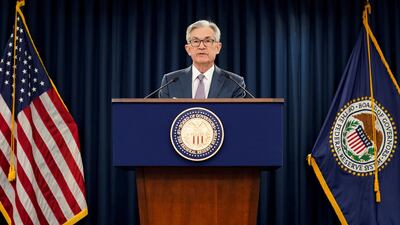The US economy will recover from the coronavirus pandemic, but the process could stretch through until the end of next year and depend on the delivery of a vaccine, said Federal Reserve Chairman Jerome Powell.
"Assuming there's not a second wave of the coronavirus, I think you'll see the economy recover steadily through the second half of this year," the US central bank chief said in an excerpt of an interview conducted on Wednesday and aired on Sunday on CBS's Face the Nation.
“For the economy to fully recover people will have to be fully confident, and that may have to await the arrival of a vaccine,” he said.
More than 36 million Americans have lost their jobs since February as the economy shuttered to limit the spread of the virus.
Countless companies, especially small businesses, are hurtling toward bankruptcy, while states and cities are confronting gaping budget shortfalls that could provoke a massive second wave of layoffs from the public sector.
The Fed chief said people should never “bet” against the American economy, but he took care not to promise a swift, so-called V-shaped, rebound.
“This economy will recover. It may take a while,” he said. “It could stretch through the end of next year. We really don’t know.”
Mr Powell’s remarks follow his grave warning on Wednesday that the US economy faces lasting harm from the pandemic if the government doesn’t step up. The comments add support to calls for more congressional spending as Democrats push for a fresh $3 trillion (Dh11tn) in virus aid on top of a record $2.2tn package agreed in March. On Friday, the House of Representatives passed the measure, though it seems unlikely to pass in the Republican-led Senate.
Mr Powell can expect questions on the scale and timing of additional fiscal relief when he appears before the Senate Banking Committee on Tuesday. He’ll also be asked to tell Americans what to expect. For all of his caution, the Fed chief also had a message of hope.
“I would just say this: In the long run, and even in the medium run, you would not want to bet against the American economy.”

